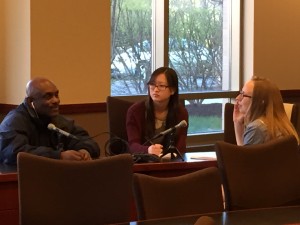
Whose Town? is a website that seeks to facilitate further discussion around unhoused people’s working issues. American University professor Dan Kerr and DC activist Eric Sheptock initially conceived of the project in the fall of 2014 after completing work on Whose Downtown – a web exhibit that examines the history for the Federal City Shelter shelter. Working with a class of twenty first-year AU students they formed the Homeless Voices Amplification Co-op (HVAC) in the spring of 2015.
HVAC is an open research group that includes people experiencing homelessness, students from universities across DC, and other DC residents. HVAC seeks to amplify stories of unhoused individuals’ past and present work experiences as a means to further activism for economic justice. We believe stories have the power to humanize individuals and undermine stigmas and stereotypes in ways statistics cannot.
From January through May 2015, HVAC volunteers conducted over forty interviews and recorded twenty-seven of them. Excerpts from twenty-one of these interviews are included here. The interviews were conducted at the Martin Luther King Jr. Memorial Library, Street Sense, Georgetown Law School, Central Union Mission, and other locations in downtown Washington, DC. Due to the location and focus of the research project, the narrators are predominately single and able-bodied individuals. Typically this category of homeless people is perceived as “undeserving” of social services and benefits because they are able to physically work and do not have children under their care. Hopefully this website will offer some insight into the challenges they face in their working lives.
This website would not be possible without the assistance of dozens of people. Most importantly, Eric Sheptock, Steve Thomas, Michael Coleman, Kanie Pendarvis, Jaqueline Turner, Kanie Pendarvis, Aida Basnight, Hope Lassiter, Carlton Johnson, Ron Verquer, Patricia Anne Smith, Leonard Hyater, Chon Gotti, Cowanda Gresham, David Chisolm, Kory Stewart, George Olivar, Joseph Slovinec, Daryl Lamont Frazier, Alvin Durham, Jamal Francis, James Higgins, Jeff Taylor, Paul Ellis, Debra Smith, James Azala, Omar Whitfield, Timothy Witcher, Robert Warren, Timothy Buie, Alonzo Johnson, David Alexander Sembly, Monsieur Alli, Emrys Tranquilos, Andrew Quin, David Brice, David Moore, David D., Tony Keener, Ronald Henderson, and John Chrisatis all agreed to be interviewed. Their insight into their personal experience offers us a lens to better understand the structures of low wage labor in Washington, DC.
Chelsea Barrera, Rachel Curry, Adam Curtis, Lauren Fay, Jared Goodwin, Catherine Harlos, Brian Harrington, Jeffery Hodgkiss, Rachel Hopmayer, Nicholas Hyland, Isaac Klipstein, Emily Krusche-Bruck, Vera Nova, Magan Robbins, Nicole Schaller, Montgomery Smith, Carlynn Yoshina, Ashley Swift, and Adam Whitehurst, Betsy Franz, G. Lee Aiken, Vanessa Welbery, Ariane Mohseni, Lalita Gozel, Tonya Walker, Renise Walker, Jessica Becher, Meha Patel, Joanna Dressel, Madison Mullen, and Dan Kerr crafted the questions, listened carefully, and conducted the oral histories for this project.
Gregory Wragg of Streats Television, Michael Stoops of the National Coalition for the Homeless, Rev. James Lewis of Central Union Mission, Robert Braunholer of Property Group Partners, and Jeff Gray, Sue Dorfman and Brian Carome of Street Sense, and Emily White and Kiho Kim of the American University Scholars Program offered significant assistance at various point in the project.
Eric Sheptock co-founded HVAC and served as the lead organizer for many of the events where interviews were conducted. Madison Mullen played a pivotal role identifying themes and potential sound clips in the interviews and crafting captions for the website. Dan Kerr, director of the American University Public History program, co-founded and directed the project, edited and drafted captions, produced the sound clips, and created the website.